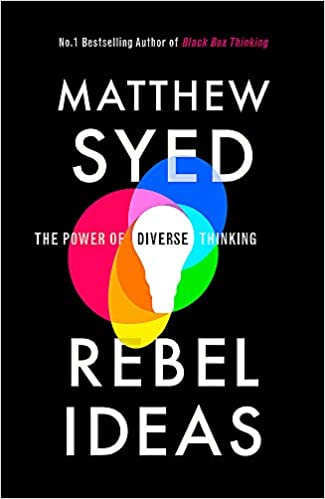Does it ever seem like the people around you are quite similar? To you and each other. I get that feeling playing soccer. My weekly game has six Alastairs in it. If you walked by, all you’d hear is, “Al! One-two,” “Square ball, Ally,” or “Goal-side, Aaahl,” shouted over and over. We kind of look the same, too. Middle-aged, beer-bellied men, well past our physical peak. In short, we’re a diversity nightmare.
You might have spotted something similar. Maybe it’s co-workers who have skills like yours. The friends you enjoy running jokes with. Or Twitter posts from people who share your political beliefs.
You could be gripped by what social scientists call “homophily.” It’s when we surround ourselves with people who look and think like we do. They agree with our points of view, talk the same lingo, and laugh at our jokes. Which all makes us feel good.
Diversity Makes the Difference

On the pitch, homophily can lead to heavy defeats and lost footballs. But what about in the workplace? To tackle complex tasks such as designing a new product or innovating your service, Matthew Syed argues you need diverse groups of people, who can look at things differently. He writes about them in his new book, Rebel Ideas: The Power of Diverse Thinking.
When people from different backgrounds – and with varied experiences – focus on a task, they bring up insights unknown to the others. Syed calls these “rebel ideas” and they shine light onto problems that stump groups of likeminded people.
Diversity at Work
There are different types of diversity. Lack of demographic diversity (which includes differences in gender, race and age) can lead to football teams full of Allys. Lack of cognitive diversity (different perspectives, experiences and thinking styles) can curb bright ideas.
Another factor that can inhibit bright ideas is what Syed calls “dominance hierarchies.” For instance, does it ever feel like the same voices dominate your meetings? They’re the first (and last) people to speak up – and often hog Zoom with their constant “contributions.”
Diversity Difficulties: the Hog Effect
I first noticed the Hog Effect when studying Creative Advertising. Coming from a school with about a hundred Allys, it was refreshing to work with Italian, Greek, Polish, American, Maltese and Irish students at university. (Sorry if I missed any).
Each week, we were briefed to create and pitch ad campaigns for different products. A bit like TV’s The Apprentice. And just like that show, the loudest students started to take over – drowning out other people’s ideas and steering us down familiar paths.
As a group, we had demographic diversity and cognitive diversity. It was the perfect conditions to come up with Syed’s “rebel ideas.” Diverse groups can make a big difference. But only if they’re heard.
Battling Alphas
Even if you manage to assemble a diverse group, they can fall prey to “dominance hierarchies.” The phenomenon goes back to the first Homo sapiens, when alphas sought to dominate and followers found comfort in being led.
This survival strategy works great when fighting off threats from animals. But it falls short in complex situations that require collective intelligence. Like making an ad.
Trouble is that our brains are still hardwired to think like our ancestors. You might have spotted it in your work meetings. Hierarchies can stop people from giving an alternative view because they worry it could cause their boss to “lose face,” and be seen as dissent. Or you, and your co-workers, only repeat what you think leaders want to hear.
Getting Heard
At university, we didn’t have Alan Sugar, Donald Trump or Arnold Schwarzenegger to fire the loudest candidates. So, we had to sort it out ourselves.
Forming smaller groups helped. You naturally feel more comfortable sharing ideas in front of fewer people. It’s called the “uneven communication problem” and studies show the bigger the meeting, the fewer individuals contribute.
It also helps to do your homework. One introverted student created a mood board to share with the class. It let her get her ideas on a page and present them clearly. And the class kept shtum to hear her out. (It helped that they were great ideas.)
Syed gives the example of Amazon’s “Golden Silence.” This is when meetings begin quietly, with attendees reading a summary of the agenda. It gives people time to think before they’re influenced by others – and lets them form their own, unique perspectives to share.
You can also try brainwriting, which allows everyone to think of solutions to problems and have their say at creative catch-ups.
Learning to Listen
By the end of the course, we didn’t have to come up with tactics to get heard. We’d built up a culture of “psychological safety,” so everyone felt comfortable sharing ideas and hearing others’ out. Introverts and extroverts.
But you don’t have to wait. Syed writes about “prestige leaders” who, instead of seeking to dominate, show empathy and solicit the views of others. And you can start doing it today.
Since I first wrote this blog, we’ve managed to widen the talent pool for our 5-a-side soccer game. The new players all come from different backgrounds, but four of them go by Mo. Now all you hear is, “Mo!”, “Al!, Mo!”…
Download Our “Rebel Ideas” Book Insight
We review the best new business books and the tested classics in our monthly Book Insights, available as text or 15-minute audio downloads.
So, if you’re a Mind Tools Premium Club member or corporate user, download or stream the “Rebel Ideas” Book Insight review now.
If you haven’t already signed up, join the Mind Tools Club and gain access to our 2,400+ resources, including 390+ Book Insights. For corporate licencing, ask for a demo with one of our team.
Do you have any experiences of rebel ideas? Or tips to increase diversity of thought at work? Join the discussion below.



